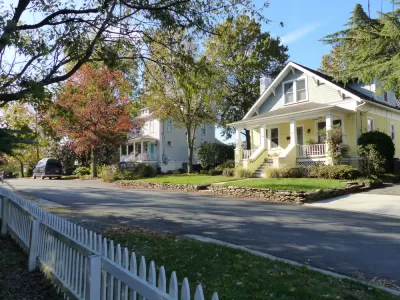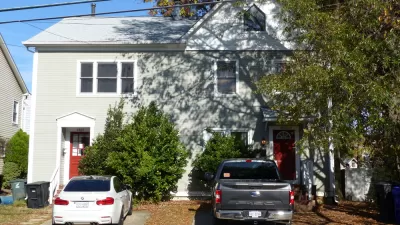Arlington County is the latest jurisdiction in the country to effectively end single-family zoning.

Arlington County, Virginia yesterday approved a new missing middle housing plan that will make it easier to build townhouses, duplexes, and small buildings with up to four, even six, residential units on lots previously designated only for single-family detached housing.
“This push to relax zoning rules, first implemented in cities such as Minneapolis and Portland, Ore., marks something of a departure from Arlington’s existing ‘smart growth’ philosophy, which encouraged density along mass-transit lines but generally kept it to a minimum everywhere else,” reports Ted Armus Armus for the Washington Post.
With the County Board vote, Arlington County becomes the first jurisdiction in the D.C. region to end single-family zoning—a form of zoning reform that is becoming more common around the country as locations reverse a century-long preference for sprawling single-family development patterns. The plan will not end single-family development altogether, but it does open up neighborhoods previously restricted to single-family detached housing alone to new forms of development. With the vote, the County Board did adopt amendments to the county’s zoning code and general plan, according to the county website for the Missing Middle Housing Study.
Arlington County Board Chair Christian Dorsey is quoted by Armus crediting the decision to a desire to move beyond the “discriminatory noise” of the county’s previous exclusionary zoning practices. But, housing costs are extremely high in Arlington County. The median home price in Arlington was $645,000 last month, nearly double the national figure, according to Armus.
The county’s new “Expanded Housing Options” (EHOs) take a notable step beyond some of the previous examples of zoning reform from the country, for example in Portland, Oregon; Minneapolis; and Gainesville, allowing up to six units on some lots.
A lot more discussion of the political debate surrounding yesterday’s historic vote are included in the source article, linked below.
The Planetizen archive also presents more historical background on the Missing Middle Housing Study that preceded the vote.
FULL STORY: Arlington ends single-family-only zoning

Maui's Vacation Rental Debate Turns Ugly
Verbal attacks, misinformation campaigns and fistfights plague a high-stakes debate to convert thousands of vacation rentals into long-term housing.

Planetizen Federal Action Tracker
A weekly monitor of how Trump’s orders and actions are impacting planners and planning in America.

In Urban Planning, AI Prompting Could be the New Design Thinking
Creativity has long been key to great urban design. What if we see AI as our new creative partner?

How Trump's HUD Budget Proposal Would Harm Homelessness Response
Experts say the change to the HUD budget would make it more difficult to identify people who are homeless and connect them with services, and to prevent homelessness.

The Vast Potential of the Right-of-Way
One writer argues that the space between two building faces is the most important element of the built environment.

Florida Seniors Face Rising Homelessness Risk
High housing costs are pushing more seniors, many of them on a fixed income, into homelessness.
Urban Design for Planners 1: Software Tools
This six-course series explores essential urban design concepts using open source software and equips planners with the tools they need to participate fully in the urban design process.
Planning for Universal Design
Learn the tools for implementing Universal Design in planning regulations.
Gallatin County Department of Planning & Community Development
Heyer Gruel & Associates PA
JM Goldson LLC
City of Camden Redevelopment Agency
City of Astoria
Transportation Research & Education Center (TREC) at Portland State University
Jefferson Parish Government
Camden Redevelopment Agency
City of Claremont





























